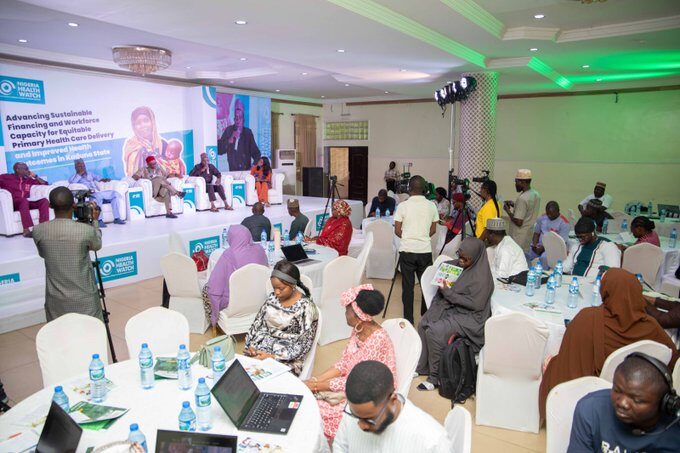NFTI recently participated in the Nigeria Health Watch policy dialogue themed “Advancing Sustainable Financing and Workforce Capacity for Equitable Primary Health Care Delivery and Improved Health Outcomes.” The event in Kaduna served as a high-level convening of key stakeholders focused on addressing persistent challenges in the state’s primary healthcare (PHC) system through actionable strategies and collective will. NFTI was represented by the Head of Digital Development, Mrs. Aisha Sani.
The symposium featured rich panel discussions on two major themes: advancing sustainable financing for equitable healthcare delivery and tackling workforce challenges that continue to hamper service delivery in PHC settings. The discussions were important given the ongoing efforts to operationalize Nigeria’s Health Sector Investment Renewal Plan (2023–2026), which aims to reposition the health system through better financing, improved workforce distribution, and enhanced accountability.
Kaduna State, in particular, has demonstrated strong political will by consistently meeting the 15% benchmark for health budget allocation recommended by the Abuja Declaration for the past three years. However, the critical issue lies not only in budgetary allocation but also in the timely mobilization, effective disbursement, and efficient utilization of these funds to translate policy into a tangible impact at the grassroots level.
The event brought together key government and institutional actors, including representatives from the Kaduna State Contributory Health Management Authority (KADCHMA), the Kaduna State Primary Health Care Board (KSPHCB), and the Commissioner for Budget and Planning, among others. Discussions centered on unlocking sustainable financing models, fostering transparency, and strengthening interagency collaboration to ensure funds reach health facilities and benefit underserved populations.
The policy dialogue underscored the urgent need for systemic reforms and multi-sectoral collaboration to build a stronger, more equitable PHC framework in Kaduna State. Participants called for data-driven decision-making, improved resource tracking, and deliberate investments in human resources for health. The consensus was clear: a resilient healthcare system is one that prioritizes both the financial foundations and the human capital necessary to deliver consistent, high-quality services to every citizen.
NFTI remains committed to supporting conversations and initiatives that advance sustainable solutions and using data-driven initiatives in health financing and workforce development.

